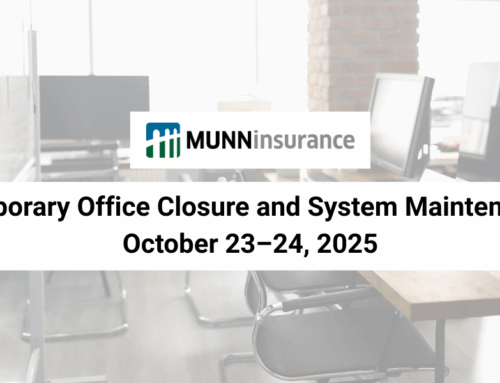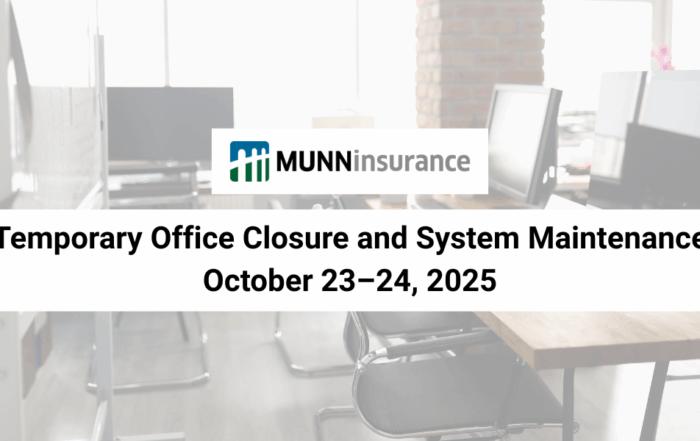What to do when a wildfire occurs
If you are a Munn Insurance customer with property coverage, you are protected in the event of a fire. While our brave firefighters will do everything in their power to get the fire under control, there are some things you can do as a property owner during and after a wildfire to keep your home and family safe.
During a Wildfire
If you are advised to evacuate, do so immediately. Take your disaster supply kit, lock your home and choose a route away from the wildfire. Watch for changes in the speed and direction of the fire and smoke. Tell someone when you leave and where you are going.
If you are not ordered to evacuate and have time to prepare your home, take the following actions:
- Arrange temporary housing at a friend or relative’s home outside the threatened area in case you need to evacuate, or contact the Canadian Red Cross at 1-800-222-9597.
- Wear protective clothing when outside, such as sturdy shoes, cotton or wool clothes, long pants, a long-sleeved shirt, gloves and a handkerchief to protect your face.
- Close outside attic, eaves, basement vents, windows, doors, and other openings. Remove flammable drapes and curtains. Close all shutters, blinds or heavy non-combustible window coverings to reduce radiant heat.
- Close all doors inside the house to prevent drafts. Open the damper on your fireplace, but close the fireplace screen.
- Shut off any natural gas, propane or fuel oil supplies at the source.
- Connect garden hoses to outdoor water taps and fill any pools, hot tubs, garbage cans, tubs or other large containers with water.
- Place lawn sprinklers on the roof and near aboveground fuel tanks. Leave sprinklers on and dowse these structures as long as possible.
- If you have gas-powered pumps for water, make sure they are fuelled and ready.
- Place valuable papers, mementos and anything “you can’t live without” inside the car in the garage, ready for quick departure.
- Move flammable furniture into the center of the home away from the windows and sliding glass doors.
- Turn on outside lights and leave a light on in every room to make the house more visible in heavy smoke.
After a Wildfire
The following are guidelines for what to do in the period following a wildfire.
- If you remain at home, check the roof immediately after the fire danger has passed. Put out any roof fires, sparks or embers. Check the attic for hidden burning sparks.
- For several hours after the wildfire, maintain a “fire watch.” Re-check for smoke and sparks throughout the house.
- If you have evacuated, do not enter your home until fire officials say it is safe.
- If you must leave your home because a building inspector says the building is unsafe, ask someone you trust to watch the property during your absence.
- Use caution when entering burned areas as hazards may still exist, including hot spots, which can flare up without warning.
- If you detect heat or smoke when entering a damaged building, evacuate immediately.
- If you have a safe or strongbox, do not try to open it. It can hold intense heat for several hours. If the door is opened before the box has cooled, the contents could burst into flames.
- Avoid damaged or fallen power lines, poles and downed wires.
- Watch for ash pits and mark them for safety. Warn family and neighbours to keep clear of the pits.
- Watch your pets closely and keep them under your direct control. Hidden embers and hot spots could burn them.
- Follow public health guidance on safe cleanup of fire ash and safe use of masks.
- Dampen debris to minimize inhaling dust particles.
- Wear leather gloves and heavy-soled shoes to protect your hands and feet.
- Properly dispose of cleaning products, paint, batteries and damaged fuel containers to avoid risk.
- Discard any food that has been exposed to heat, smoke or soot.
- Do NOT use water that you think may be contaminated to wash dishes, brush your teeth, prepare food, wash your hands, make ice or make baby formula.
- You may find yourself in the position of taking charge of other people. Listen carefully to what people tell you, and deal patiently with urgent situations first.
In addition to insuring your home, we are committed to helping you and your loved ones stay safe when disaster strikes.
Related News
Recent News
Temporary Office Closure and System Maintenance – October 23–24th, 2025
As part of our exciting relocation to our newly renovated Head Office at 187 Kenmount Road, St. John’s, Munn Insurance will be completing a major IT and phone server migration this month. To complete this [...]
It’s Not Just Price: What Really Matters When Choosing Home & Auto Insurance
Let’s be honest — price is usually the first thing people look at when shopping for home or auto insurance. And that’s completely fair. No one wants to pay more than they have to. But [...]
The Real Costs of ATV Accidents on City Streets in NS and NL
We’re seeing a growing and concerning trend in communities across Newfoundland and Labrador and Nova Scotia: more and more people — especially youth — are driving ATVs, dirt bikes, and other off-road vehicles on public [...]












